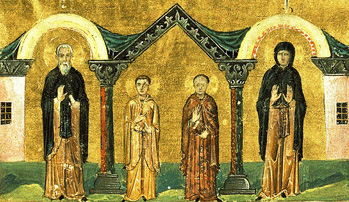
John 20:11-18 (Matins)
Ephesians 5:9-19
Matthew 4:25-5:12
The Ladder
Blessed are the pure in heart,
For they shall see God.
(Mt 5:3)
Here on the Fourth Sunday of Great Lent,
we contemplate once again spiritual instruction
written at the turn of the fifth-to-sixth century
in a monastery of the Sinai wilderness.
These teachings were collected into a codex, or book,
entitled
simply "The Ladder."
We know little about its author,
but not nothing.
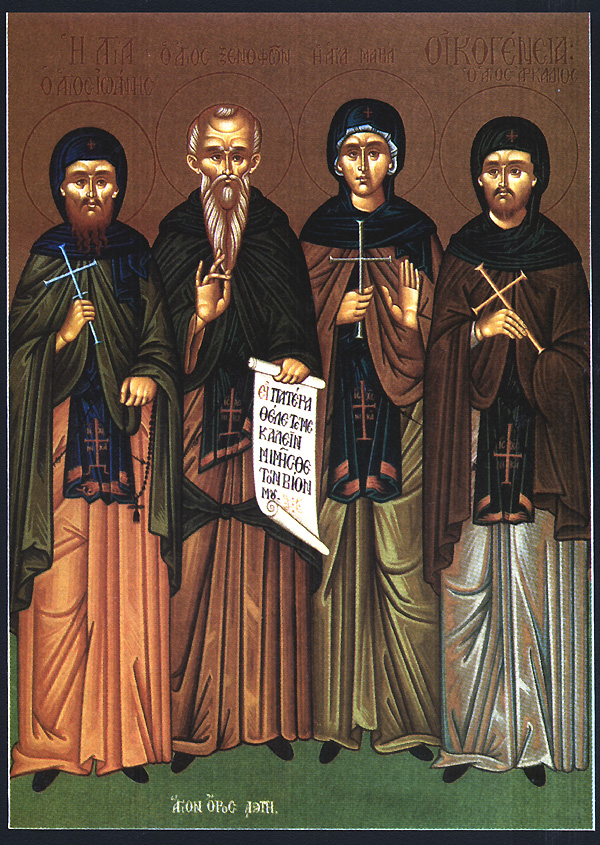
He was born
in Constantinople
to saints,
St. Xenophon and St. Maria,
who named their son John
(perhaps after the Theologian).
His brother they named Arcadius
(the Greek word for paradise
perhaps signifying Eden).
Both were well-educated
and
sent off to Beirut in Phoenicia for advanced studies.
During their voyage to university (we would say),
their ship was wrecked.
Arcadius, by twists and turns, ended up in Jerusalem,
where he sought out the Holy Sepulchre offering prayers for the safety of his brother.
Soon he would meet a holy man who invited him to enter the monastery where he served.
Arcadius gained acceptance and over time wonderful spiritual development.
Meantime,
John came safely ashore at an unknown village along the eastern Mediterranean coast.
He sought out a monastery,
for there he knew he would encounter goodness and decency.
He was warmly welcomed
and
formed friendships with the monks.
Before long, he would enter their company becoming a monk himself.
During this time,
his parents did not know what had happened to their sons.
They received no news from Beirut,
so they hoped that all was well,
living with daily anxiety however.
They prayed fervently to God that,
whatever might have happened to them,
their sons were safe, living lives pleasing to God.
Then,
after some years had passed,
news of the shipwreck finally reached them.
They learned that their sons were lost.
They begged God that John and Arcadius might have survived.
They continued to pray faithfully
that all would be well
and
that the four might someday be reunited.
Then, on a day,
these two saints received a vision.
They saw John seated on a throne
with a scepter in his hand
and
a royal crown set upon his head.
Also they saw Arcadius wearing a diadem of stars,
holding a Cross in his hand.
They interpreted the Cross to signify Jerusalem
and
set off on a holy pilgrimage.
Upon arriving to Jerusalem,
they happened to encounter the same man
who had invited Arcadius to join the monastery.
He by now had become the superior of that community,
which,
as it turned out,
was attached to the Church of the Holy Sepulchre.
He invited the pilgrims to sup with him,
and
they accepted with pleasure.
During the meal the saints were deeply impressed with the holy character of the
monks they met.
"Reverend Father,"
Xenophon said,
"what marvelous disciples you have!
What modest and reserved behavior!
I am moved just looking at them.
I have prayed to God that my sons might look like this."
The old superior replied,
"Here are your sons."
Their parents did not recognize them,
so transformed through prayer and fasting had they become.
Of Arcadius we can say no more.
But,
by the grace of God,
the path they followed towards Heaven,
was recorded by his brother, John
in
a book that
has survived the ravages of time.
Through God's saving power,
we are afforded a Divine invitation
like the one they received
by embracing this holy book.
The book continues to contain the essence
of their spiritual transfiguration.
Their
path was not extreme.
No beds of nails.
No paths of hot coals.
We know that John nourished himself,
eating in moderation.
He did not impose sleepless nights upon himself,
lest he become inebriated through sleep deprivation.
He slept as necessary to keep up his strength.
He practiced mindfulness,
remaining vigilant,
guarding his mind that it not become corrupted with evil images and thoughts.
He detected the presense of the evil one.
He wrote,
I do not fast excessively, nor do I give myself over to intense all-night vigils,
nor lay upon the ground, but restrain myself .... and the Lord soon saved me.
|
John's life was frequently that of a hermit
though he welcomed seekers who asked for guidance to salvation.
All who met him found him to be gentle
offering decent and godly affection.
Inevitably,
envious monastics
sought to depreciate him.
They were piqued by his gifts of insight and articulation.
So John responded
by remaining absolutely silent for one year.
This quenched the competitive spirit around him
causing his offending brethren to recover themselves,
realizing that they needed him,
that God had sent him for their own divine appointments.
Soon,
reconciling with St. John, they were able to
return to their own journeys of theosis,
coming to him as they needed guidance.
Let us also seek his guidance.
For the paths to Heaven are not many, but one ....
though surely we come to it from diverse backgrounds.
It will not be different on that account,
however.
The same traps and pitfalls await each of us.
Let us give thanks to God that St. John's counsel has come down to us intact
and
efficacious unto the Gate of Heaven.
☦
The way to Heaven is not shrouded in mists and holy secrets.
This most important of all learnings has been revealed with clarity,
taught with exactitude by God Incarnate,
and
then passed down by the Apostles, the Holy Fathers, and the saints through the centuries.
Today we celebrate a gift
received from a saintly guide
—
St. John of the Ladder.
This same guidance was ardently sought by sixth-century monks living in a monastery of the Holy Land
and
heard heart-to-heart from this hero.
When they heard his words, they knew them at once to be true .... as we will today.
For they were not revolutionary words.
They were never-before-heard words.
God has already inscribed His ways and counsels upon our hearts.
The precepts are familiar.
We are strangers in a strange land
(or, more precisely, a land made strange by our polluted thoughts
and corrupt actions).
Yet, within each of us remains the pure boy or girl that God had created from the beginning.
Our task as men and women is to be rid of these impurities,
to let them leach out physically and spiritually.
And soon
we will find that the purified people we long to be ....
are the people we already are,
and
were at our birth .... though the years may have caused our memories to fade.
It is such people,
the truest expression of ourselves,
of which the Kingdom of Heaven is made.
Otherwise,
Heaven would not be Heaven.
It would be false,
not true.
The false world does exist.
It is here on earth.
We pass it off as acceptable .... though it is not.
And beneath that false world,
ruled by the father of lies,
is madness and grotesquery.
Let us take hold of godly counsel which was already ours,
for any of us journeying to Heaven might have written it.
It is a travel log detailing what the pilgrim encounters along the way.
That is all.
We give thanks that St. John of the Ladder,
for he took the time to record
this family heirloom (we might say),
for it always already belongs to each of us and all.
What follows are section headings from
his book called
The Ladder.
We pray that by contemplating these general headings,
you will be moved to learn more about each one (following the link above).
For here is guidance offered by Xenophon and Maria's son John.
It is a precious book
carefully made through many hours of loving labor
and
pains-taking
then passed down to us with reverence.
Let us awaken to a sobering principle:
no will ascend to Heaven who ignores this path.
For personal purification is the indispensable condition of theosis.
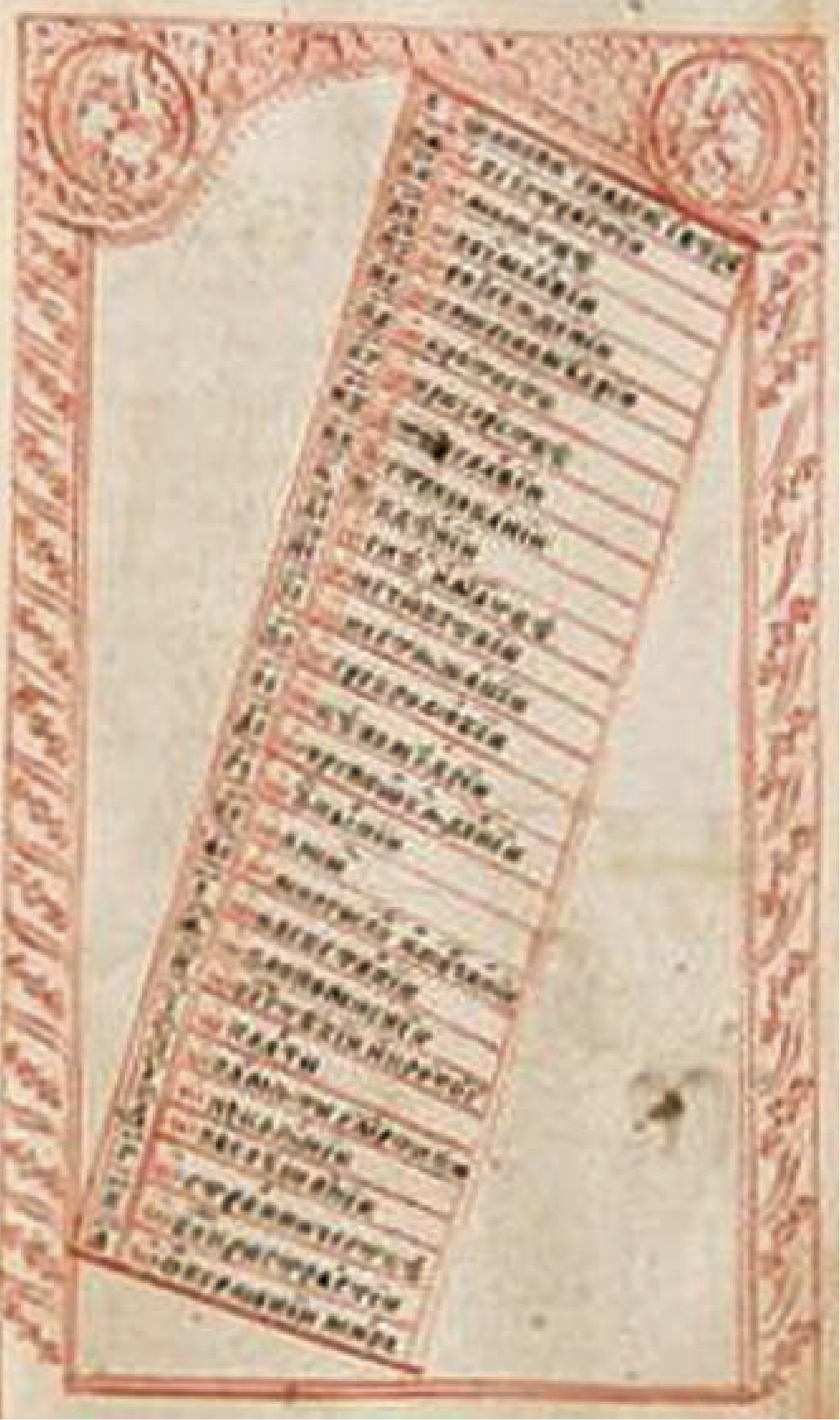
1-4: Renunciation of the world & obedience
1. Be an ascetic
2. Be one detached from material things
3. Be a stranger in a strange land on pilgrimage
4. Be a devoted son under care of a spiritual father
5-7: Penitence
5. Be a slave (like St. Paul) & prisoner in the House of Death
6. Be a hermit awaiting departure from earthly life
7. Be a mourner in the night seeing joy in the morning
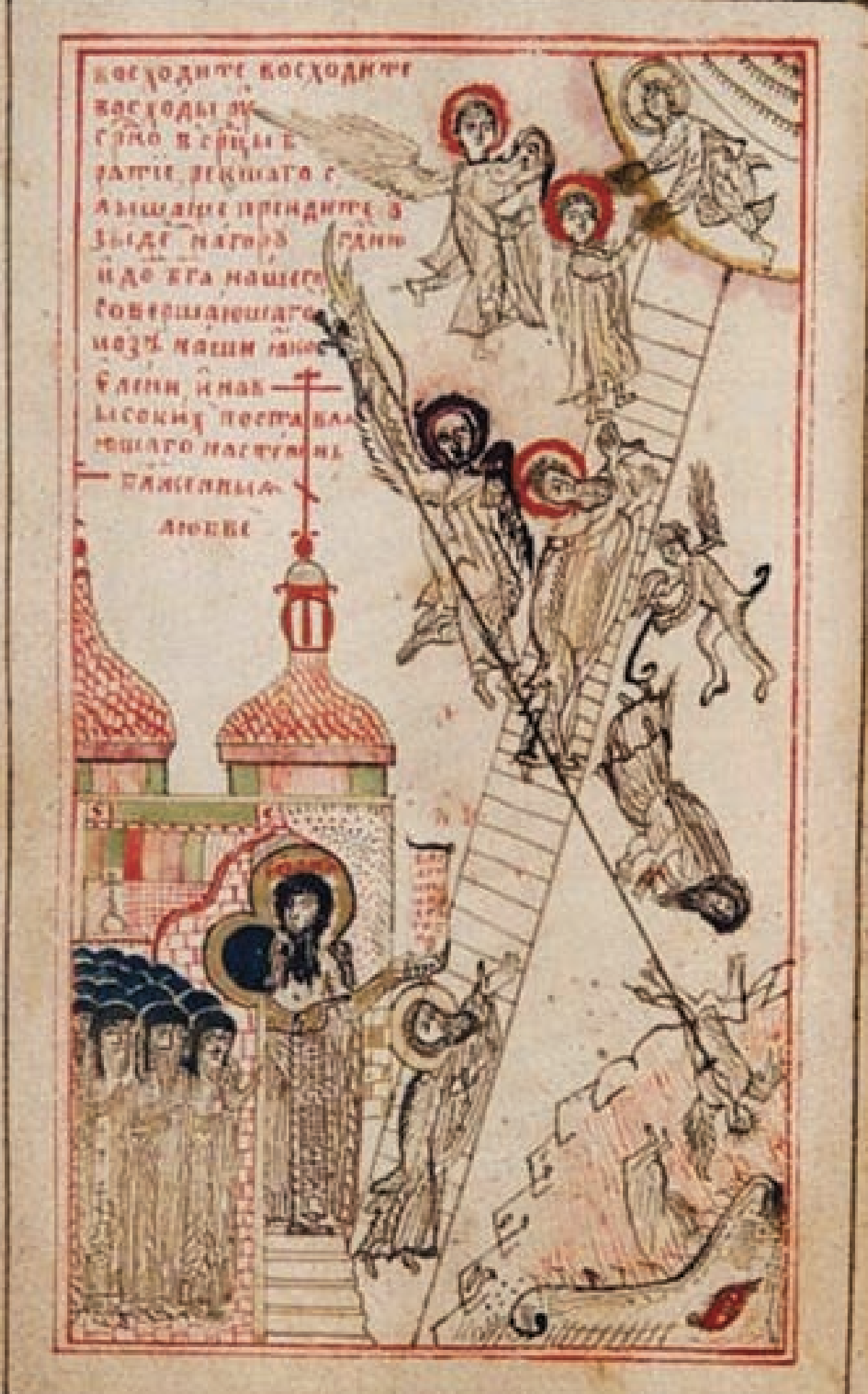
8-17: Defeat of vices and acquisition of virtue
8. Be one who is lowly and meek
9. Be one who regrets past wrongs
10. Be one who has slandered
11. Be one who has given tongue free reign
12. Be one who has lied
13. Be one who is despondent and egoistical
14. Be one who has given in to appetites
15. Be one who has polluted purity feeding on garbage
16. Be one who has loved possessions
17. Be one released from worldly things all its enticements
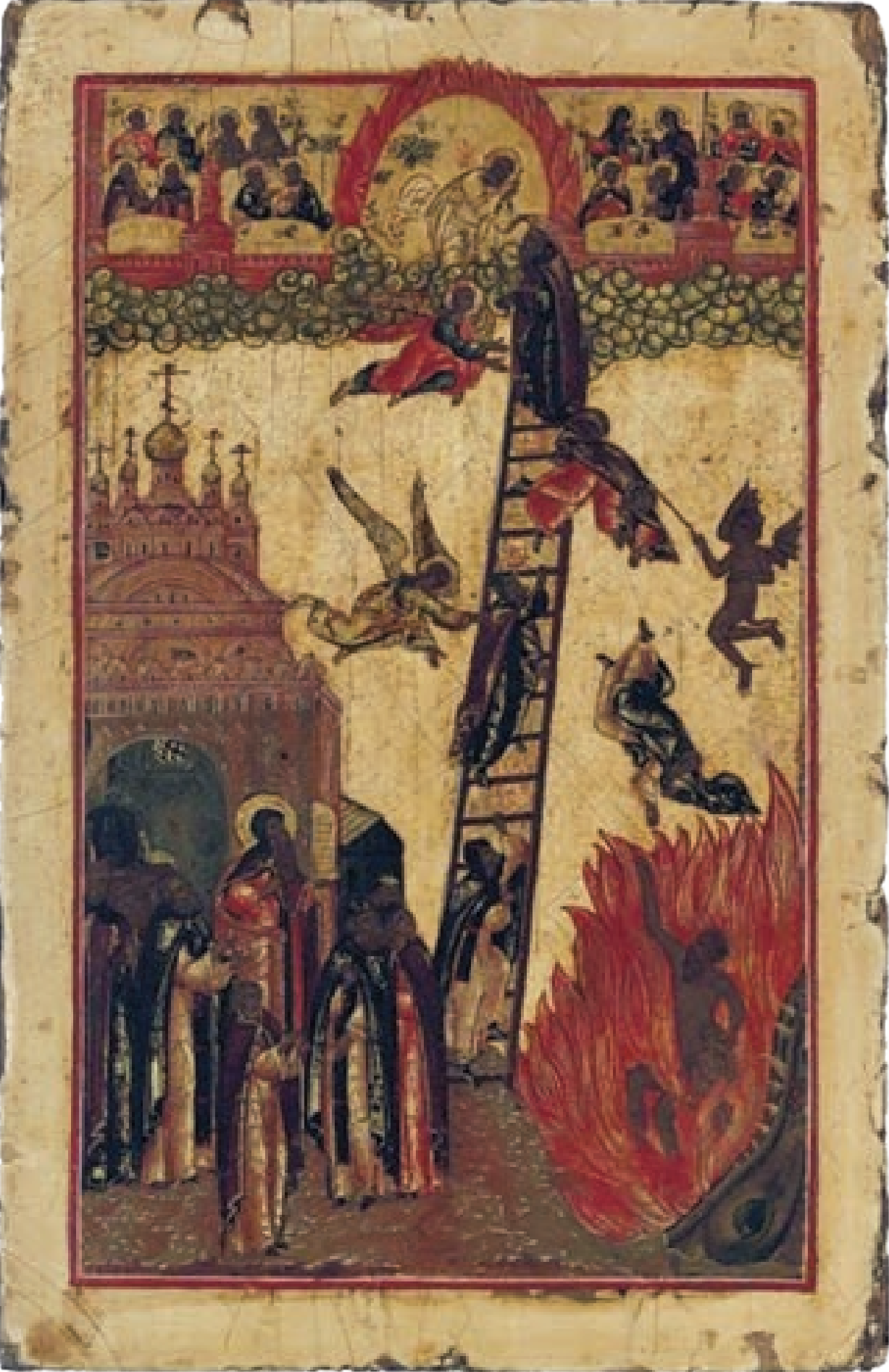
18-26: Avoidance of the traps of asceticism (laziness, pride, mental stagnation)
18. Be one awakened from listlessness and apathy
19. Be one who prays and sings with the congregation
20. Be one practicing physical and spiritual vigils
21. Be one overcoming childish fears & cowardice
22. Be one seeing and rejecting vainglory
23. Be a master over filthy images & thoughts
24. Be one who is meek, simple, and sincere
25. Be one who has risen above the passions and nearing Heaven
26. Be one who has risen above earthbound life and struggle
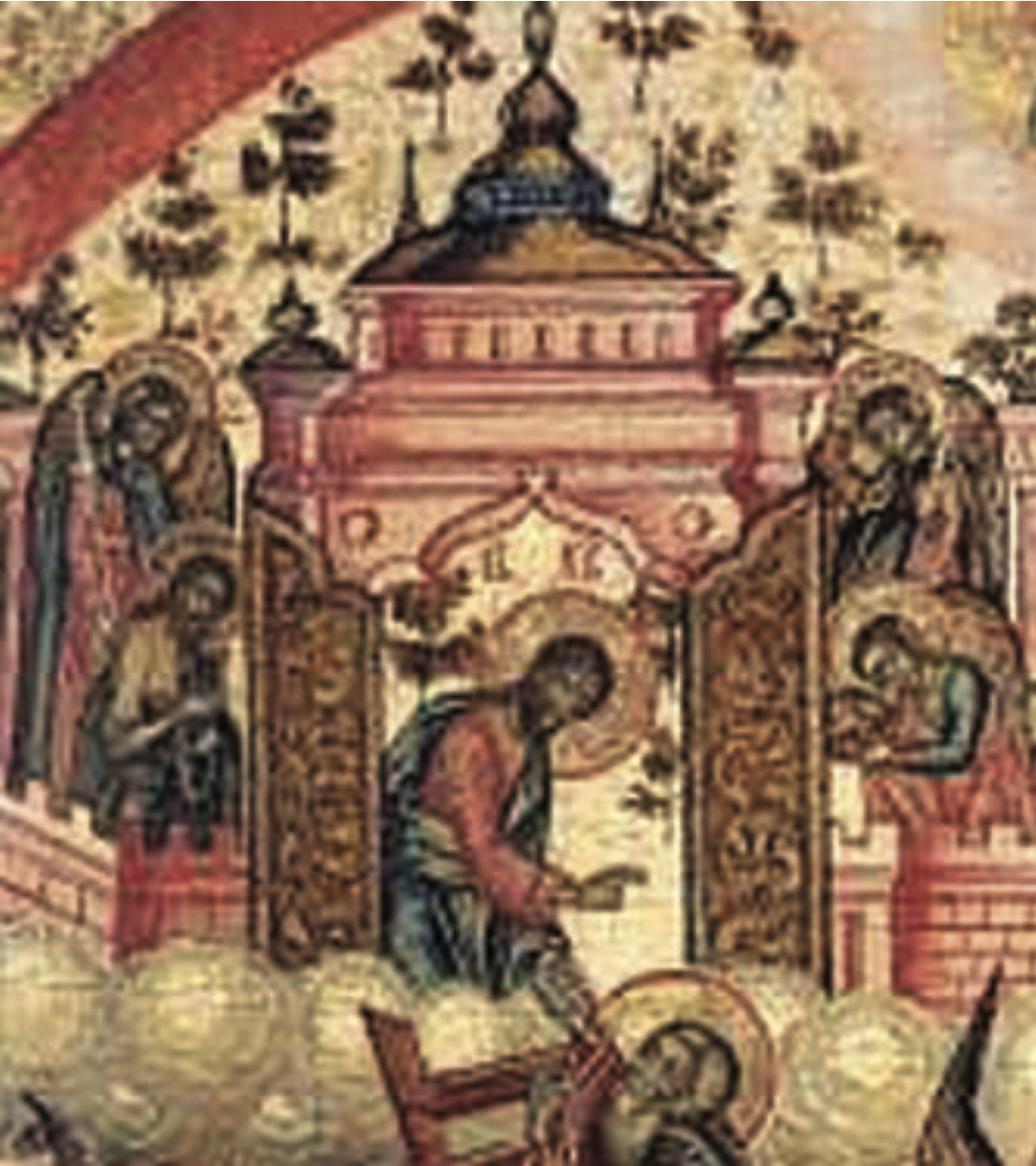
27-29: Acquisition of hesychia (spiritual peace), prayer, and apatheia (dispassion)
27. Be one who is serene
28. Be one who is holy & well-practiced in prayer
29. Be one who resurrected, who is Godlike in dispassion & perfection
30. Entrance into the Kingdom of Heaven and union with the Most Holy Trinity
Why do we seek this path?
Why do we transform our lives in order to climb to High Heaven?
Anyone who has been in love can tell you.
You see,
Heaven must inevitably be an abstraction for us.
We have not entered Heaven and then returned.
Yet, on earth there is a true artifact of Heaven.
And that is Love.
In the first blush of love,
the one who loves beholds the beloved and says,
"She is far above me, unattainable!
How could I dare confide my feelings of love to one so high and fine?"
Is this not the way we think about Heaven?
"It is too high for me!
Too fine!"
We take cover in what we claim to be our humility.
We claim that at least we are not prideful.
But in so doing we end up questioning the promises of Christ.
Has not Heaven been made for us
and
we for Heaven?!
Is not Heaven like the earthly creature whose spiritual beauty
we admire from afar.
"She is far beyond me!"
we say.
And yet we nurse a hope that our love will be received,
that we will be accepted.
And against all odds,
he is received.
He cannot believe it!
He is walking on air.
Naturally, he puts the best foot forward,
revealing only what is good and beautiful within.
He dresses and grooms himself meticulously.
He hastens to rid himself of all that his unworthy
(which he had permitted himself in moments of despondency).
But despondency is now banished!
And he diligently keeps far from the beloved anything that is low or unfit,
which is to say, he dies to his former life
and
is reborn into this new life of love.
Tokens of love are exchanged.
Yet, a lapse intrudes.
He lets down his guard.
He is tempted by the former things.
But he will not give in!
For love has taught him that this new life is all that matters.
He is willing to burn his whole world down in order to have it.
And
each next glimpse of the beloved continues to inspire him.
She
has become his inspiration,
his muse.
And his art has become the inner life,
its effect influencing everything he says and does.
This will be his masterpiece.
And the beloved is both
the one who inspires it
and
its greatest appreciator.
At length and over time,
he can imagine no other life than the one that she cherishes.
He has fashioned a whole world in the holy light of her expectations.
And
now
he has come to love her with an all-consuming admiration and love,
cherishing her,
adoring her.
The life he makes each day is formed in the image of that shared love:
his expectations for her and her gratitude for him.
This is the none other than the Kingdom of Heaven
—
to let one's life become filled with love,
which is the only divine property to be found on earth.
Love is your first thought upon arising
and
your last thought of the
day.
And love will sanctify all the hours.
Earthly beauty gives us our
first glimpse of God's beauty,
and
earthly love, in response to that transcendent beauty,
gives us our first feelings of love of God.
We say,
"This is too high for me to attain!"
Yet,
we find that our love is accepted by God .... and returned.
We learn that each step we take to show ourselves in our best light
is received by God with approval and joy.
And then the most wonderful revelation of all:
the discovery that the holiness we had admired from far .... we have become
—
so high, so unattainable, yet now as familiar as our own souls.
Are these not the rungs of St. John's ladder?
Is this not the same transformation that he has recorded
—
from
leaving our past lives behind to the attainment
of beauty and serenity and union with the One Who is Love?
May I conclude with a simple but far-reaching truth?
No one has ever chosen Hell.
People go to Hell because they have chosen the wrong Heaven.
Do we not learn this lesson on earth?
Chasing false images of love,
which we call lust, is self-destructive.
The choice of the wrong spouse, for carnal reasons, is always a ruinous choice,
from which your life will never recover.
This story is as old as Eden,
the original scene of wrong choices.
Satan is the deceiver, the father of lies, the deuce, the counterfeit.
He is always double.
And he holds before us always the false Heaven
—
whether in the form of shallow charms
or
in the form of man-made morals and ethics that lead away from God.
Be careful to whom you give your heart,
for the outcome is an everlasting Hell .... or Heaven.
In the Name of the Father and of the Son and of the Holy Ghost. Amen.




